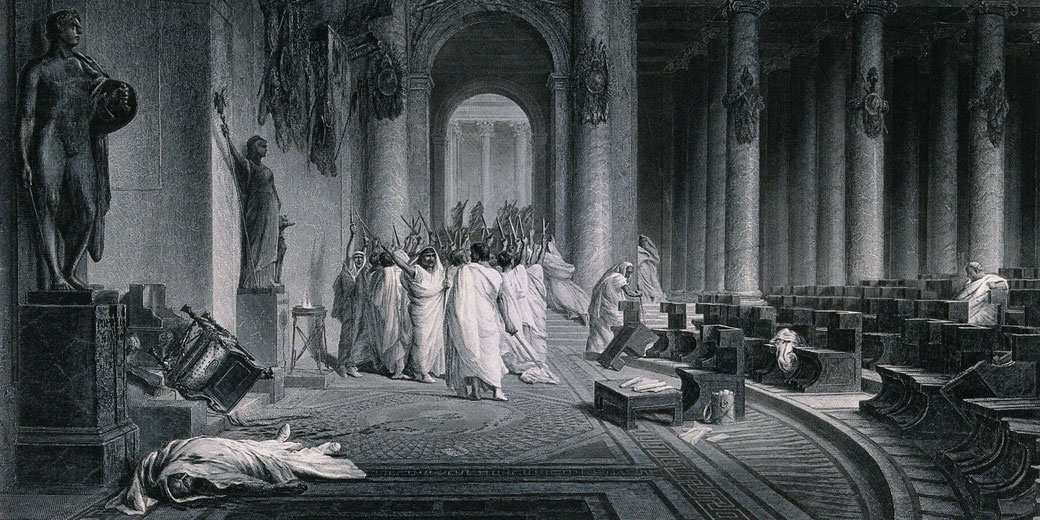The supernatural warnings before Caesar was assassinated

On March 15, 44 BCE, Julius Caesar, the famed Roman dictator, was assassinated in the Roman Senate by a group of senators who had conspired against him.
However, the events leading up to Caesar's assassination were shrouded in mystery and intrigue, with many historians and scholars still debating the true motivations and intentions behind Caesar's warnings before his death.
Why did some people want Caesar dead?
There were many factors that led to the conspiracy to murder Julius Caesar. One of the main reasons was his increasing power and ambition, which had caused concern among many of the Roman elites.
Caesar had been appointed as dictator for life, which gave him unprecedented power and made him essentially a monarch.
This move was seen as a threat to the traditional Roman system of government, which was based on a balance of power between different factions.
Additionally, Caesar had made many enemies during his rise to power. He had defeated his political opponents in a civil war and had become increasingly autocratic in his rule.
Many senators and other prominent figures in Rome saw him as a tyrant who was willing to trample on the rights and traditions of the Roman Republic in order to achieve his own goals.
The conspirators, led by Cassius and Brutus, were also motivated by their own personal grievances against Caesar.
They felt that he had ignored their advice and had not rewarded them adequately for their loyalty.
Cassius, in particular, was known for his deep-seated hatred of Caesar and his ambition to become a powerful political figure in his own right.
Finally, some historians speculate that the conspirators may have been motivated by a desire to restore the traditional Roman Republic and to prevent Rome from becoming a monarchy under Caesar's rule.
The conspirators may have seen themselves as defenders of the Roman Republic and its traditions, and may have believed that the only way to preserve those traditions was to remove Caesar from power.
Spurinna: The first warning
Spurinna, the haruspex who warned Caesar of the impending danger, was an expert in divination and the interpretation of omens. He was widely respected in ancient Rome for his abilities and was often consulted by prominent figures in the city.
Spurinna's warning to Caesar was based on his examination of the entrails of a sacrificed animal. In ancient Rome, the practice of haruspicy involved examining the organs of a sacrificed animal to predict future events. The haruspex would look for signs and omens in the organs, such as the liver or the heart, to interpret the will of the gods.
On February 15, specifically, Spurinna found that a bull that was missing its heart. While it is unclear whether the bull's condition was a genetic abnormality or a symbolic warning, Spurinna advised Caesar to be cautious for the next 30 days, not just on the Ides of March.
The conspirators were aware that Caesar was scheduled to embark on a prolonged military campaign that would take him away from Rome on March 18. Therefore, the prophecy's end date was not a coincidence, as the assassins had to act before Caesar left the city.
Calpurnia: The second warning
Calpurnia, Julius Caesar's wife, had a terrible dream on the night before Caesar's assassination. In her dream, she saw Caesar's body in her arms, dying after an assassination. This dream left Calpurnia shaken and convinced that something terrible was about to happen to Caesar.
Calpurnia's dream had a powerful effect on her, and she pleaded with Caesar not to attend the Senate on March 15, 44 BCE, the day of his assassination.
Caesar initially tried to reassure Calpurnia, telling her that the dream was simply the result of her anxiety and fears. However, Calpurnia was persistent and begged Caesar not to attend the Senate that day. She was so insistent that Caesar eventually relented and agreed to stay home, at least until he received further confirmation that the danger had passed.
What this tells us
Calpurnia's dream highlights the role of intuition and divination in ancient Roman society. Dreams were considered to be an important source of divine communication, and many Romans believed that they could be interpreted to reveal important truths about the future.
Calpurnia's dream, along with Spurinna's warning based on his examination of animal entrails, shows that the Romans took divination seriously and that even someone as powerful as Caesar was not immune to the warnings of his wife and the haruspex.
What do you need help with?
Download ready-to-use digital learning resources
Copyright © History Skills 2014-2025.
Contact via email
With the exception of links to external sites, some historical sources and extracts from specific publications, all content on this website is copyrighted by History Skills. This content may not be copied, republished or redistributed without written permission from the website creator. Please use the Contact page to obtain relevant permission.





